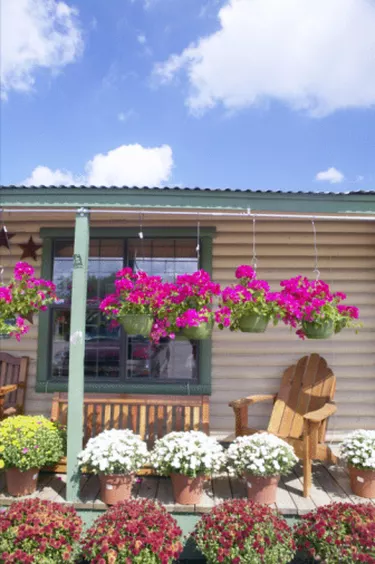
Mobile homes are nicer now than ever before. Many are designed with elements that rival "stick-built" homes at a fraction of the cost. Enclosing the underside of your mobile home will add to its curb appeal and will protect your investment for years to come, but you aren't limited to ordinary skirting materials. There are numerous options to choose from that will set your home apart from the rest without breaking the bank.
Vinyl Lattice
Video of the Day
Vinyl lattice is inexpensive and, being weatherproof, it is appropriate for mobile home skirting. The classic look of lattice is diagonally intersecting strips that form a diamond shaped grid, but other interesting configurations are available. Because it is ventilated by design, lattice is more appropriate as mobile home skirting in warmer climates. It is available in sheets of varying lengths and widths, which makes customization as basic as measuring and cutting with a jigsaw. Vinyl tracks are attached along the underside of the home to lock the upper edge in place. The bottom edge may be secured with tracks or countersunk into the soil. Stapling mesh screen to the back of the lattice before installation will help secure the perimeter of the mobile home, keeping small animals from gaining access to the underside of your home.
Video of the Day
Reclaimed Brick
Brick may seem like a pricey option, but many salvage yards accept brick from old remodeling projects and sell it for less than the cost of new brick, according to Old House Web. City services also reclaim brick when condemned properties are demolished, and many offer brick for free if you will haul it away from the demolition site. Because your mobile home already has structural piers in place, installing brick skirting doesn't require any special masonry knowledge. Basic brick mortar and a trowel are all the supplies you need to install an attractive skirt that provides a great deal of protection from animals and harsh winds. Always fashion at least one vent on each side -- by leaving an open space in the brick layout -- to prevent moisture accumulation, and don't forget to leave a space for a door or other means of access to the underside of your mobile home.
Concrete Block
Your mobile home probably has concrete block piers in place. Surrounding the home with block will finish it neatly while protecting the crawlspace from the elements. Block is not as difficult as brick to install, and it is one of the least expensive masonry products. You may stack the blocks without mortar; because of their weight and bulk they will stay in place. If you desire, apply a layer of mortar between blocks for an even sturdier mobile home skirt. Blocks are designed with hollows, so turn one block with hollows facing out on each side of your home to create vents in the skirt. Solid skirting also helps to insulate heating and air conditioning ductwork, which is often situated under the house.
- Manufactured Housing Institute: Model Installation Standards - Final Rule Summary
- Georgia Department of Community Affairs: Manufactured Home Compatibility Standards
- Consumers Union: Consumers Union’s Tips on Mobile Homes
- Louisiana Department of Natural Resources: Energy Efficient Ideas for Mobile Homes
- Old House Web: Finding Reclaimed Bricks
- U.S. Department of Energy: Landscaping for Energy Efficiency